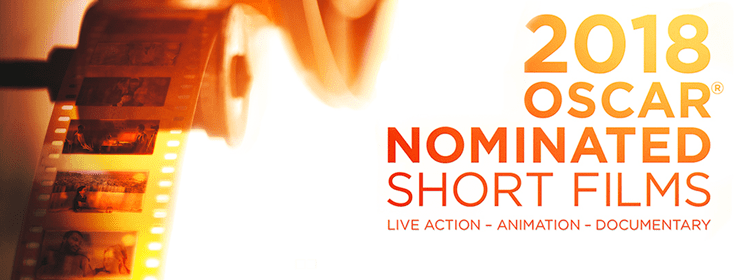
ShortsTV, the World’s Only Short Film Channel (www.shorts.tv), working with Magnolia Pictures, will open “THE 2018 OSCAR NOMINATED SHORT FILMS” on more than 500 screens across the United States, Canada, Europe, Latin America, South Africa, and Australia on Feb. 9, 2018. THE 2018 OSCARS NOMINATED SHORT FILMS will showcase the Live Action, Animation, and Documentary short-film nominees’ compilation as three separate theatrical events.
This marks the 13th consecutive year of the Oscar Nominated Short Films theatrical experience. It is the only opportunity for audiences to watch the short film nominees in theaters before the Academy Awards ceremony on March 4, 2018. The Oscars will be held at the Dolby Theatre at Hollywood & Highland Center in Hollywood and televised live on the ABC Television Network.
The nominees’ countries of origin range from the U.K, France and Germany to Kenya, Australia, and the U.S. This year the U.S. leads with the most shorts nominations (5 Documentary Short Film nominees, 2 Live Action Short Film nominees, and 2 Animated Short Film nominees). Furthermore, in the Documentary Short Film category, 3 of the films are directed by women, one of the Animated shorts nominees has a female co-Director, and 3 of the Live Action Short Film nominees were inspired by or based upon true stories.
The Live Action shorts nominees:
DeKalb Elementary (director Reed Van Dyk, USA, 21 min) – Actors Steven Hall and Cassandra Rice give two compelling performances as a troubled young man who shows up at a school with a rifle and the school administrator he speaks through / holds hostage in this short which contains subject matter that might be too intense for some. Was surprised no one tried to go at the man when people walk by him or when he turns his back but writer / director Van Dyk wants empathy for the disturbed individual.
My Nephew Emmett (director Kevin Wilson Jr., USA, 20 min) – Set in Money, Mississippi, August 28, 1955, the story of Emmett Till’s murder is told from the point of view of his uncle. Mose Wright, who knows trouble is coming when he learns of his nephew whistling at a white woman. The inclusion of archival footage of Wright was powerful, but am left curious why this well-known story is told as opposed to so many others as the known outcome undercuts the tension.
The Eleven O’Clock (director Derin Seale, Australia, 13 min) – A psychiatrist has an appointment with a man who thinks he’s a psychiatrist in this amusing mystery and battle of wills. Very good performances by both Damon Herriman and writer Josh Lawson that walk a fine line between comedy and drama as does the story because it’s not clear where it’s going.
The Silent Child (director Chris Overton, United Kingdom, 20 min) – A therapist comes to visit a deaf girl whose parents are indifferent to her condition, although once revealed why, it seems like it should be further explored. The film is well acted, but it comes to an abrupt end with title cards revealing a couple statistics about deaf children and a mission statement from the filmmakers that they “hope this film contributes in the fight for sign language to be recognised in every school across the globe.”
Watu Wote / All of Us (directors Katja Benrath, Germany / Kenya, 22 min) – Based on a true story from December 2015, a young Christian woman takes a 31-hour bus ride to Mandera to visit her sick mother. Her husband and baby were recently killed by Muslims, so she doesn’t interact well with them. The bus is stopped by Al-Shabaab terrorists who want to kill any Christians aboard and demand the passengers identify them. It’s a tense, but predictable story.
Most of these films want viewers to have empathy for those like the subjects in their stories, so it’s hard to say, which will connect more with Academy voters. Personally, The Eleven O’Clock was the most interesting of the group and would get my vote. The plot wasn’t predictable and it was entertaining. It also wasn’t burdened with the heavy-handedness the others suffer from due to obvious messages they are trying to share.